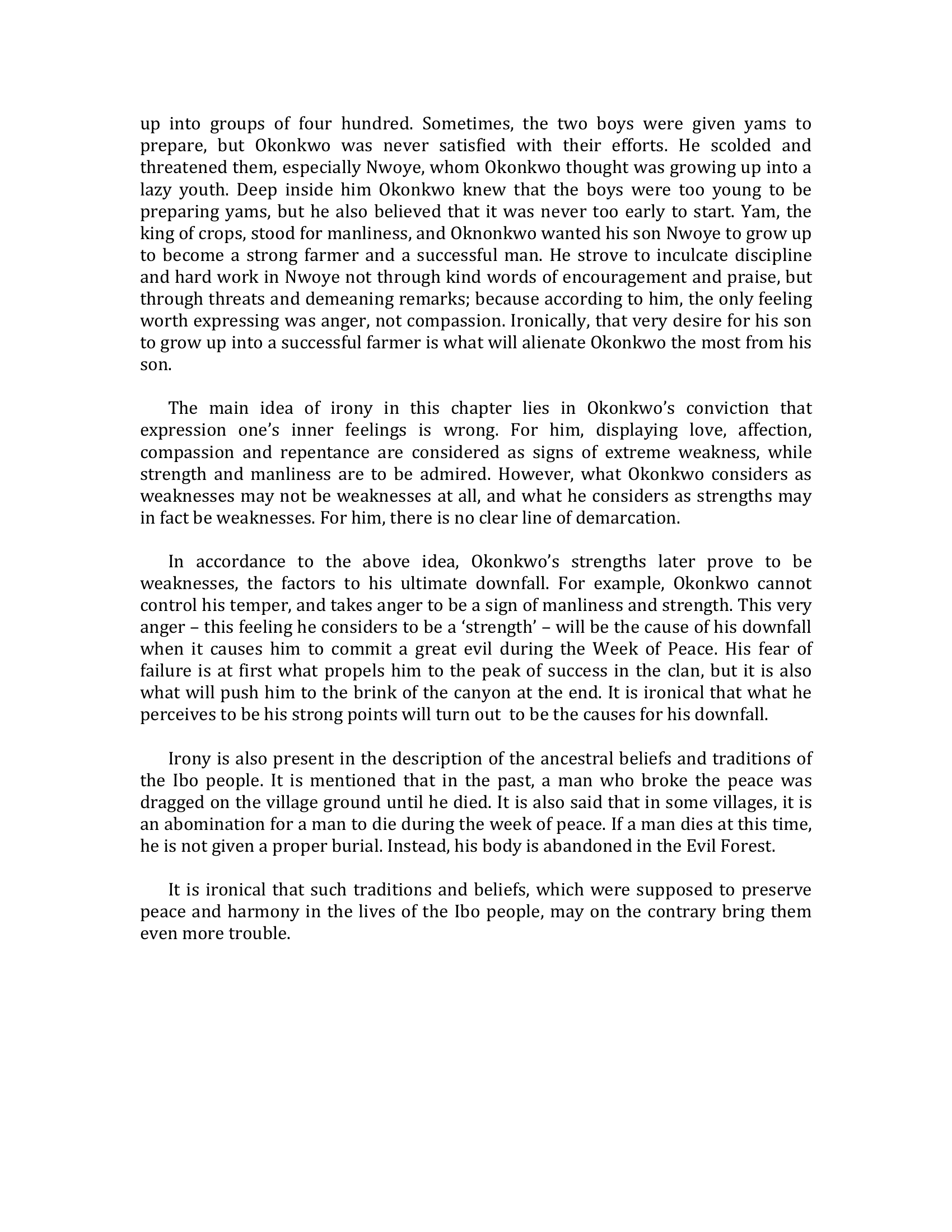Show that chapter four of 'Things Fall Apart' is conceived in irony
Publié le 25/06/2012
Extrait du document
- It is ironical because what Okonkwo perceives to be strengths may not be strengths at all – they may be weaknesses. No line of demarcation.
- It is ironical that what he considers to be his greatest strengths will be the factors contributing to his downfall.
It is widely said that ‘Things Fall Apart’ is a novel conceived in irony. One of the chapters heaviest with irony in ‘Things Fall Apart’ is the fourth, in which we find further elaboration of Okonkwo’s character as well as development of the plot. The irony is subtle yet direct, characteristic of Achebe’s simple and poignant style.
«
up into groups of four hundred.
Sometimes, the two boys were given yams to
prepare, but Okonkwo was never satisfied with their efforts.
He scolded and
threatened them, especially Nwoye, whom Okonkwo thought was growing up into a
lazy youth.
Deep inside him Okonkwo knew that the boys were too young to be
preparing yams, but he also believed that it was never too early to start.
Yam, the
king of crops, stood for manliness, and Oknonkwo wanted his son Nwoye to grow up
to become a strong farmer and a successful man.
He strove to inculcate discipline
and hard work in Nwoye not through kind words of encouragement and praise, but
through threats and demeaning remarks; because according to him, the only feeling
worth expressing was anger, not compassion.
Ironically, that very desire for his son
to grow up into a successful farmer is what will alienate Okonkwo the most from his
son.
The main idea of irony in this chapter lies in Okonkwo’s conviction that
expression one’s inner feelings is wrong.
For him, displaying love, affection,
compassion and repentance are considered as signs of extreme weakness, while
strength and manliness are to be admired.
However, what Okonkwo considers as
weaknesses may not be weaknesses at all, and what he considers as strengths may
in fact be weaknesses.
For him, there is no clear line of demarcation.
In accordance to the above idea, Okonkwo’s strengths later prove to be
weaknesses, the factors to his ultimate downfal l.
For example, Okonkwo cannot
control his temper, and takes anger to be a sign of manliness and strength.
This very
anger – this feeling he considers to be a ‘strength’ – will be the cause of his downfall
when it causes him to commit a great evil during the Week of Peace.
His fear of
failure is at first what propels him to the peak of success in the clan, but it is also
what will push him to the brink of the canyon at the end.
It is ironical that what he
perceives to be his strong points will tu rn out to be the causes for his downfall.
Irony is also present in the description of the ancestral beliefs and traditions of
the Ibo people.
It is mentioned that in the past, a man who broke the peace was
dragged on the village ground until he died.
It is also said that in some villages, it is
an abomination for a man to die during the week of peace .
If a man dies at this time,
he is not given a proper burial.
Instead, his body is abandoned in the Evil Forest.
It is ironical that such traditions and beliefs, which were supposed to preserve
peace and harmony in the lives of the Ibo people, may on the contrary bring them
even more trouble..
»
↓↓↓ APERÇU DU DOCUMENT ↓↓↓
Liens utiles
- The Voyage Out (1915) Virginia Woolf Chapter I As the streets that lead from the Strand to the Embankment are very narrow, it is better not to walk down them arm-in-arm.
- Puppets I INTRODUCTION Punch and Judy Punch and Judy are characters in an English hand puppet show that first appeared in 1662.
- A pragmatic approach to metaphorical irony
- Does the "access" or "service" model that has replaced the "ownership" model in the business practice of companies such as Kindle/Amazon take fairly into account the interests and/or rights of the consumers?
- GRANDEUR ET DÉCADENCE [The Mighty and their Fall]. Ivy Compton-Burnett


